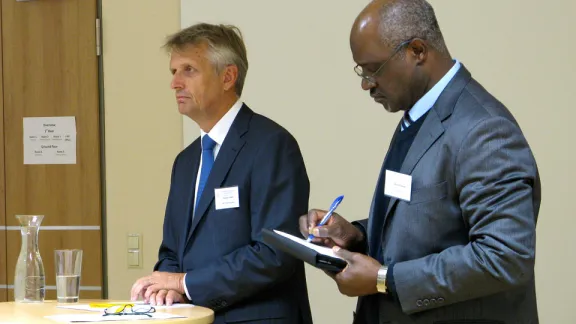
(left to right) Rev Martin Junge, LWF General Secretary, and Rev. Dr Musa P. Filibus, LWF Department for Mission and Development Director, at the Lutheran Theological Education for Communion Building consultation in Wittenberg © LWF/Anli Serfontein
Global LWF Consultation on Theological Education Begins in Wittenberg, Germany
The Lutheran Reformation did not stop with the events in 1517, but continues today in a world shaped by global transformation and social and economic upheavals. Therefore Lutheran church leaders should speak out against injustices, The Lutheran World Federation (LWF) General Secretary Rev. Martin Junge told a global consultation on 18 October.
Addressing theologians and leaders from Lutheran churches around the world, seminary and university educators at the LWF gathering in Wittenberg, Germany, Junge stressed it was important for Lutherans to engage with the wider society at both local and global levels in providing a theological education that takes into account a fast-changing world.
“Why aren’t the Lutheran churches much more on the forefront?” He asked, referring to the current financial and ecological crises. “I have been asking myself, when the Lutheran concept of freedom in the public space, which finds its boundaries in the suffering neighbor is such a strong contribution to move beyond the predicament in which the human family finds itself today?” He continued, “How are leaders in our churches equipped to contribute, so that they participate in a spirit of interdisciplinarity, into these discussions at all levels: locally and globally?”
Junge’s keynote address set the tone for the 18-22 October consultation under the theme, “Secure foundations of the past and aspirations for the future: Lutheran Theological Education for Communion Building towards 2017.” The event is being hosted by the Evangelical Church in Central Germany and the LWF German National Committee.
One of the meeting’s goals is to find ways of strengthening Lutheran identity and to consider focus themes for the 500th Reformation anniversary in 2017. Junge told the delegates the three LWF cornerstones for the anniversary are: Lutheran Reformation is a global citizen; ecumenical accountability; and that churches of the Reformation are in an ongoing process of reform and renewal.
Many Centers
His address mainly elaborated Lutheran Reformation as a polycentric construction, in which there is not one center or a few centers, but many. He urged that the Reformation anniversary should be approached in its global context.
“Reformation history needs probably to be written in plural form: reformation histories. The challenge, also for this consultation, is to learn to approach the LWF in such polycentricity and to develop both the processes and the methodologies so that interaction, dialogue and learning can take place across contexts,” Junge said.
The general secretary underlined LWF’s understanding of mission as holistic (encompassing proclamation, service [diakonia] and advocacy) and emphasized the need to adapt this comprehensive approach to theological training. “My observation is that this concept needs an urgent translation into current processes of education and formation, particularly when it comes to the dimensions of diakonia and advocacy, which I still see as rather underdeveloped and underrepresented in curricula and programs.”
Global Citizen
He said the consultation’s venue—Wittenberg, where Martin Luther lived and worked—was an expression of “our desire to grasp what went out from this historic center of Reformation and how this has become today a global citizen. … But equally important is our eagerness to understand what is coming back from such extended travel and how conversations are organized that assist the reception of these gifts in a spirit of mutuality.”
The estimated 50 participants have travelled from as far as Madagascar, Malaysia and Mexico, representing the seven LWF world regions—Africa, Asia, Central Eastern Europe, Central Western Europe, Nordic countries, Latin America & the Caribbean and North America.
During the ensuing discussion, Junge told delegates that from the experience of his own church in Chile under the dictatorship, there is a saying that “‘A people without a memory is a people without a future.’ The same applies to a church, meaning that this is not about getting stuck in history but to empower us to continue walking into the future.”
Responding to Junge’s address, Rev. Dr Sven Hillert from the Church of Sweden said, “As Lutherans we have to ask: what can we do today to have the same effect that Martin Luther had in his time?”
Rev Lilana Kasper from the Evangelical Lutheran Church in Southern Africa noted that the LWF general secretary had “reminded us that the upcoming celebrations should not be a once-off event and then be forgotten, but it should be a spark for renewal.”
Discussions continue in plenary panel sessions and in small groups.
(Written for LWI by Berlin-based journalist Anli Serfontein)


